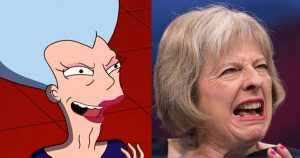
Whichever it is, more interesting questions are whether she will still be Prime Minister at the end of 2020 and whether Jeremy Corbyn will still lead the Labour Party. In the case of the former, much depends on Brexit. As things stand, at time of writing anyway, the whole Brexit project is looking increasingly ‘flaky’. The EU negotiators are pointing out with increasing frequency, and bluntness, that the UK postion and attitude is unrealistic to the point of denial. Over the next 18 months the economy looks like an inflationary one, with pressures on domestic budgets already rising. There is no more room for manoeuvre because, since the “world-wide financial crash”, we have already seen the exchequer squeeze every last penny out of public services until the social infrastructure is in tatters. The pips haven’t just squeaked, they’ve liquidised.
The Liberal Democrats, the Greens, and the Scot Nats are all pushing for a ‘soft’ or even non-Brexit. If it all goes horribly wrong, the Torys have form in back-stabbing their leaders, however popular they may have been, but actually it is Jeremy Corbyn that is most like a dead man walking: in fact he is ‘undead’, a political zombie. Whatever one thinks of his programme, his personal ethics, and his integrity, it is clear after 3 weeks of the snap-election campaign that he has been left to fight this election on his own. So far the only Labour spokespersons have been John Macdonald (shadow chancellor) and Diane Abbott. The latter is a public relations disater in that she is not liked by the population at large and is prone to gaffes.
Where were the Labour party’s heavyweights? Why didn’t they speak? I guess because, having failed twice to unseat Corbyn by internal ‘democracy’, they hope the wider electorate will do the job for them by delivering a crushing defeat on 8th June.
This is unforgivable; by not fighting hard for the Labour ‘ticket’ they are consigning the working classes and the disadvantaged to at least 5 more years of Tory rule, and this time unfettered. The Liberal Democrats, having paid the price of an uncomfortable coalition in the Cameron-led government by getting hammered in 2015, won’t make that mistake again. They know they can’t win but, pointing to Labour disarray, have pitched themselves as the only viable opposition party to a Tory majority government.
In the immediate foreground, as a sort of ‘trailer’ for the General Election, we’ve just had local government, and regional mayoral, elections. It is true to say that local elections are unreliable as an indicator of the national electoral mood; for one thing the voter turnout in the former is typically much lower than the latter. However, this time, I think it is safe to say the poor showing of the Labour Party is, if anything, likely to under-predict their impending humiliation in June because I doubt the Labour Party will manage to get its voters out. The traditional Labour voters who deserted for Brexit and UKIP are unlikely to return to the fold. Tory tails are up, Labout tails are dragging, and yet Jeremy Corbyn is merely expressing “disappointment” at the poor local election result.
Disappointment? Man up, Jeremy, it’s an effing disaster. He says he has 4 weeks to get his message across: 4 weeks? Jeremy you’ve had two years, what difference will 4 weeks make? In my opinion it is so bad that the only useful thing he can do to turn things around is to step down and give the electorate that 4 weeks to find belief in an alternative leader. Barring an act of God that’s not going to happen, so I would go as far as saying would-be Labour voters should, as an act of damage limitation, vote for whoever is likely to stop a Tory being elected in their constituency.
